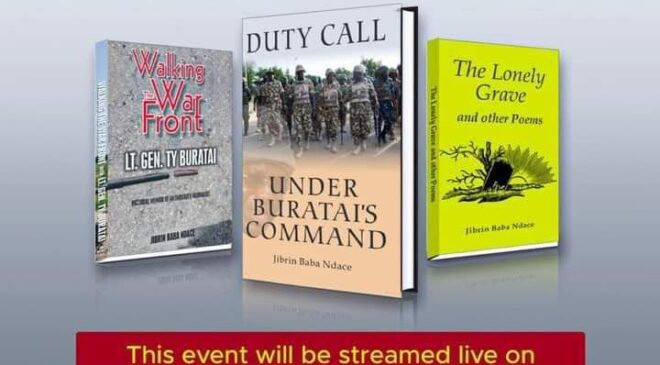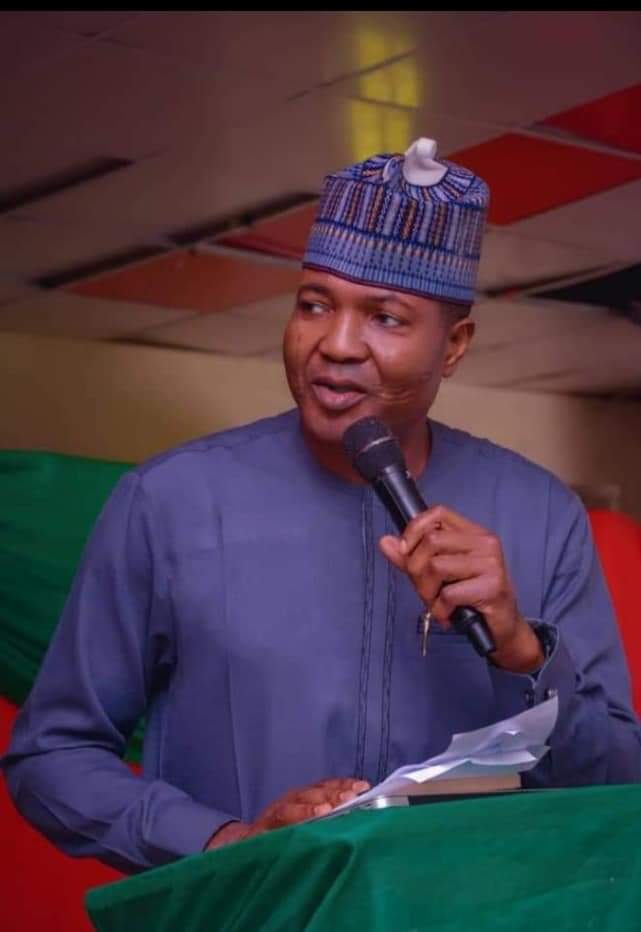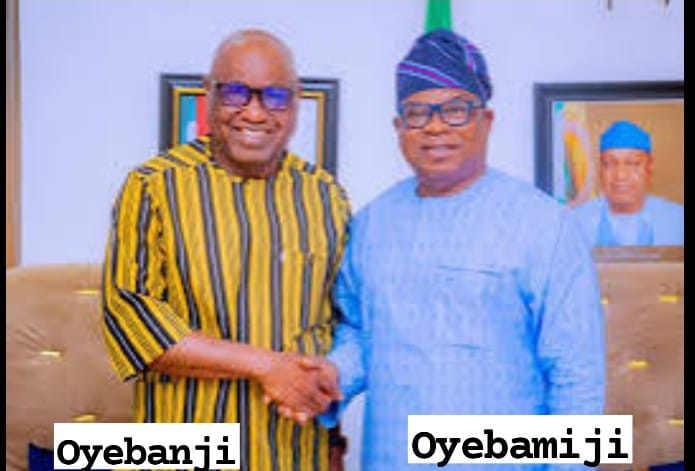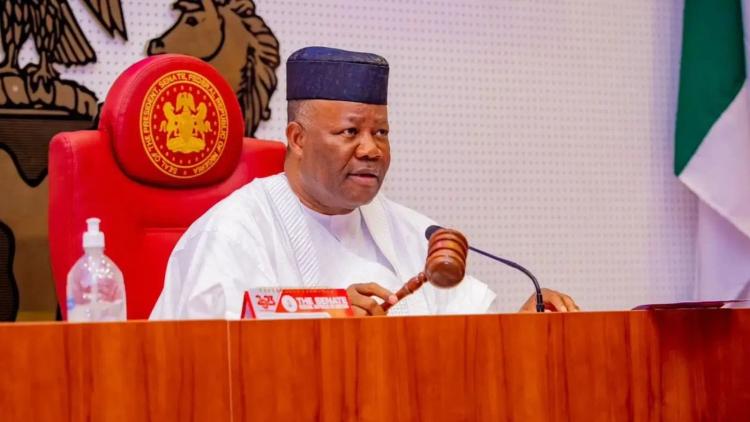Books are mediums where informations about things and events are recorded unto. In other words, books are store houses of knowledge; Like this, there are Books whose characteristic purpose are just as stated but their are also Books that become documents in their own rights. Penal codes in courts of law are documents, constitutions are documents, Books signed in transactions are documents, including certificates of death and births. What this means is that, written things that could assume air of legality and could be quoted to support legal and law endeavors are documents;
And so Jibrin Baba Ndache’s book “Duty Call” is not a book but a document; a document of deed, with it’s full legal authority and could serve as such even in courts of Law, because someone is there who appended his name to the goings and comings on the matter of Boko Haram insurgency, at least within the time frame he puts down.Names, dates and players were mentioned and up to the moment of publishing this, no discerning view has being recorded. Very few, if there’s any, had talked about the Boko Haram insurgency in one whole piece, especially on the topic or anything related to it in one place and in one platform like “Duty Call” .The Document naturedness could also be hinged on the fact that it’s being penned by an experienced defense Correspondent and given more credibility by being embedded and had witnessed combat as it unfolded; this is what this is all about, three things in one, defence correspondent, war reporter and embedded journalist, make no mistake these are three different things but in Ndace it was folded into one. Again, this is not a work of fiction, this is fact from the first set of embedded in the history of Nigerian Army. Embedded are journalists the Military allowed to join them when going on combat or operation, alas this book is a first hand account, reported in first person singular narrative technique; consequently “Duty Call” assumes a document status.

As deliberate,Ndace bowls down on the topics in the book after a very exhilarating and impressive acknowledgment of people who had one way or another help in making the book see light of the day. In his characteristic manner He(Ndace) starts with a comprehensive history of Nigeria from independence to date. He tells of the tragic Biafran civil war then sets about to relay the history of military coups that eventually culminated into the Biafran war. Ethno-religious crisis wasn’t left out. The Author reveals different religious crisis up to Kaduna riot of
2002, the MEND insurgency down to the current Boko Haram insurgency. Ndace confines all today’s insurgency and crisis to, in his own conception” fault line” Thus in page 2 he points;
” The major ethnic groups in
Nigeria are Hausa-Fulani,
Yoruba and Igbo… There are
also major-minor languages…
Friction among these different
groups often assume tribal or
religious or even mix of the two
dimensions. These are the
fault lines…”
The Author asserts the causes that led to crisis in Nigeria today, including the Boko Haram insurgency. It safe to claim that there’s hardly any Book or document today which stated these tons of information all at once and in one piece. He further elaborates in page three (3) thus:
“…Nigeria’s journey to
nationhood has been turbulent
and tumultuous, due largely to
her internal contradiction and
inability of the political players
and other influential
stakeholders to safely and
adequately address their
differences for a more united
and prosperous country”
Testifying to the well researched nature of the work is Ndace’s extensive quotations and references to experts and authors of reputes on the subjects of crisis like Paul Collier,Baden Paul and Max Siollun, he makes that the latter stated in his Book “Soldier of Fortune” in page five (5) thus:
“… The counter-coup of July
1966, was carried out as a
revenge for the elimination
of northern political and
military leaders, as well as
inability of the military head
of states to punish the
executors of the failed coup”
The Author again captures the irony and tragedy of Nigerian crisis when he quotes in page nine(9) WO Yamusa Zakari’s (A famous trainer in NMS in the early 50’s) reaction in his biography, thus;
“… it caused (me) great
sadness… to see some (of
my boys whom (I) had
trained and moulded into
one united and disciplined
army fighting each other
during the Nigerian civil war”
Ndace rounds up chapter one with a patriotic call of the former Vice President Osinbanjo who said “…We need to start building a new tribe called Nigeria” A very beautiful call indeed.
Chapter two cites good deliverance of the historical perspective on Boko Haram insurgency, so well researched. Ndace states (and truly so as this writer oversighted the origin and date when world’s insurgency and terrorism started) in page 29 thus;
“… The end of cold war, however,
saw the escalation of intra-state
and violent conflicts around the
World,particularly in the developing
nations. Many of the conflicts
were proxy wars by the super
power states…”
Being a “player” himself in the security cycle, the Author further added about the early days of Boko Haram in page 32 thus:
“…While many Nigerians saw
Boko Haram at it’s embryonic
stage as Northern and Borno
problem, my colleague Madina
Azaki and I as regular
participants on NTA Tuesday
Live, were consistent and
persistent in our call on the
Jonathan administration to
heed the voices of Nigerians
calling for national action
against the challenge”
In the typical and authoritative fashion of a Player and expert on insurgency, He states a fact on how Boko Haram’s evolution in page 33
“…A confrontation was sparked
with security agencies…it turned
bloody in the city of Maiduguri
with lots of casualties. This
among other things prompted
the group to move to border
towns from where they
regrouped and began to launch
attacks first on security officials,
escalating to all out raids on
police stations…on various
locations across the country…
summary execution of their
leader, Muhammad Yusuf,
exacerbated rather than curb
their radicalization ”
In confirmation to the “document” naturedness of “Duty Call” as stated in the title of this piece, the Author aptly states (and authoritatively so) in page 32;
“As a defence correspondent with
Blueprint Newspaper, public
affairs commentator and
research assistant on defence
and security, I followed the
trend of insecurity in the country
and the challenges which our
armed forces and other security
agencies were confronting in
various internal security operation
(s) across Nigeria, up till the
emergence of the Boko Haram”
Ndace in Chapter three opens up on some of the events that led up to the kidnap of the “Chibok Girls” . He’s straight and didn’t bar the truth as he made that the whole saga came about as a result of “Dereliction of duty” on the part of so many, including the then President, Jonathan. Here he meticulously sets about that revealing the ethnic and religious composition of Chibok Community in page 39, Viz;
“…It was a normal community,
where Christians and Muslim
lived peacefully… families
co-exist happily with Muslim/
Christian siblings… Chibok was
off the radar of Boko Haram or
so it seemed, until April 14/15
2014, when in the dead of night
Boko Haram invaded and
kidnapped 276 girls from
Government Girls Secondary
School Chibok”
From the Book we learnt new things which hitherto were not in public domain before about Chibok saga and if they were, the manner it is presented in the Book now made it worthy to note; like this very one in page 38, thus;
“… Chibok is a center where
over 530 girls from other rural
senior secondary schools
registered for the West
Africa Senior Secondary
Certificate Examination,
WAEC…”
This Writer didn’t probably get the information the first time but this time it sits well, things become clear as to why this or that happened even when a whole community was under insurgency.
Side by side in discussing the debacle of Chibok girls, Ndace rightly discusses other kidnappings and massacres on students and schools in other locations, as there can’t be other better places to discuss the aforesaid and it indeed guaranteed grouping of ideas informations with same characteristics; He puts these events in their respective time frames of occurances, in the order they occur, up to the last of them, this further attests to deliberateness in plot summary of the whole work. Take a look here, page 39;
“The group started to attack
schools as a soft target in
2010. Many students were
killed and schools closed. it
also carried out abductions
of girls,boys,men, women to
use as sex slaves and recruits”
We were able to know as well in this chapter through the Author’s researches the true origin of the#Bring back our Girls hashtag, that it was first actually first tweeted by one of these two people, Barrister Ibrahim Abdullahi or Kayode Akinteme ” Who were in attendance at the Port Harcourt events” when the city was nominated as UNESCO world’s Book Capital city” on the 23rd April 2014.
The far reaching and courageous stand I have seen so far from any writer on who to blame and culpable on the whole saga so far is by this Author and he stubbornly and courageously stands by it, thus he stated in page 45:
“The attitude and temperament
of President Jonathan and his
late response didn’t come as a
surprise. There’s lack of political
will. The Jonathan administration
saw Boko Haram as a creation of
northern elite to undermine his
administration… the failure of
the Nigerian leadership at the time
to take decisive action created a
gap”
Ndace in Chapter four again delves into an historical perspective before discussing or treating the subject matter at hand. His penchant to relay historical background is unrivaled . Should I begin to tell you that this action tells you that the author has grasp and understanding of what he wishes to unveil? it further gives credibility to “authenticness” of his exercise. In this chapter He relays the origin of the Nigerian Army from the 1862 when the force was referred to as” Glovers Hausa” to the later named “Hausa constabulary” unto this present time Nigerian Army” During these times he states that the force changed into various names according to era. However, the history of the Nigerian Army is on purpose culminated into that of General Mohammadu Buhari, Nigeria’s former President, hence the title of the chapter is methodologically keyed thus”The return of a seventh looser” this is what it means, Buhari lost the 2003 Presidential polls and lost again at the court; 2 times, so is that of the 2007 and 2011 until finally at 2015 when he finally won elections. To sum, Ndace quotes John Paden who is in some respect a credible Biographer of Buhari thus in page 51:
“… But who is (Muhammadu)
Buhari?
This is the significance, Buhari cannot be devoid and excused from the Nigerian project, courtesy, Ndace’s thorough researc . He reveals in page 58:
“Buhari ‘s first major involvement
in the Nigeria project was
during the counter coup of July
1966 which was led by lieutenant
Colonel Murtala Mohammed”
He(Ndace) further paraphrase Max Siollun in his book”Soldier of fortune” thus:
“Buhari has been involved in all
but one change of government
and coups in Nigeria’s history…”
Ndace’s exhortations of Buhari comes to a head when he states in page 63 thus:
“Looking at his (Buhari) military
and political journeys spanning
over six decades, it is safe to say
that President Muhammadu
Buhari ‘s return to as President
and Commander-in-Chief of
Nigeria armed forces in 2015…”
Cunningly ,Ndace starts this chapter reeling out notable events in the history of the Nigerian Army and the players in various Nigerian Military coups throughout and how the northern officer Corp came to be: but indeed the chapter is all about keying in the place of Buhari and where he fits in this unpleasant story of the current insurgency in Nigeria, this is indeed deliberate and typical of Ndace, it’s how he chooses to take you through what he wants you to see and notes, literally he consciously engineers his reader’s perceptions and he’s so good at it rather surprisingly.
In chapter 5, Ndace writes about official handing and taking over in a democratic setting. He painstakingly discusses this by running us through the history of it from 1960 when Balewa took over from the British in Lagos. He also talk about the importance and significance of speeches given at this events especially the first phrase that would come out of the mouth of the sworn in President. Incidentally this chapter’s title “The Eagle Square Declaration” goes rightly with the subject it’s reeling, what always happen at the square when new Government turns, is handing and taking over the reins of Government; that isn’t actually what the Author wishes to tell us, but meticulously preparing us to the symbolism of the venue, the sworn and the subject of the Book, alas he’s preparing to connect us with the informations ahead. In this chapter Ndace does a comparative analysis of Nigeria and Indonesian democratic system, the organic resemblance and thus in page 67 He writes:
“In some democracies such as
Indonesia, the inauguration of
a new President and his deputy
holds every five years in the DPR/
MPR Parliament Building, in the
capital, Jakarta. Indonesia like
Nigeria has gone through
decades of Military rule.
“Like Nigeria, Indonesian Politics is
dominated by deep influence of
retired Generals…”
Ndace connects the above to what he wants us to see when he puts in page 71:
“Buhari commanded the image
of a battle-tested, no-nonsense,
incorruptible and disciplined
officer who had been on this
road before. He was therefore
coming to the office for the
second time prepared… Unlike
Obasanjo, Buhari made history
by being the first to defeat a
seating President… Unlike
Obasanjo,the new President had
being a serial Presidential
candidate, serial election loser and
serial court goer…”
A good writer sets a mechanism prior, so he could connect various data, across many field by stringing events and people in deliberate manner; below reveals all He wanted us to get all along in a co-ordinated and in few phrases, page 73;.
“He(Buhari) lived up to
expectations of the gathering at
Eagle Square, Nigerians and the
World,when he ordered the
relocation of the Theatre
Command of the counter-
insurgency Operation from Abuja
to Borno, the epicenter of the
Boko Haram insurgency”
That is it, typical Ndace, stringing events, players, history and places to drive home points. If this chapter hadn’t being there the whole part one would have made little sense.
Chapter six is the last of the chapters in the part one of “Duty Call” . Again another player in the insurgency story is discussed,General Tukur Buratai. This chapter looks like a structural continuation of the last but with a different people altogether.Typical of the Author, obsessed with laying ideological foundation, he quoted yet another player of the past to drive home his points, this time around, General McChrystal, that “Leadership (is) the single biggest reason organizations fail…” The reason the Author quotes the fore is simply this, Buratai. That Leadership is what’s needed to defeat collective problems and so He(Buratai) was the topic of the chapter. He states thus in page 84;
“On July 13, 2015, President
Buhari appointed service
Chiefs… Major General Tukur
Yusuf Buratai, Chief of Army
Staff…These appointments
marked an end to, and a
beginning of another era in the
national security architecture of
Nigeria. There was a feeling of
reinvigoration, couple with
expectations on the future of the
counter-insurgency battle”
As a result of the above, the Author sets about discussing the subject of the chapter. The way and manner he does it with much enthusiasm even when he didn’t say it, betrayed the deep set reverence and respect Ndace has for the General.The likes of this, page 87;
“Buratai is a Man of destiny
whom some of his course
mates reffered to as a cat with
nine lives-a rejected stone that
became the head stone…”
Ndace adds further in same page
“An officer who was on the same
course with him told me that the
rumour of his retirement was so
serious that he was serially
embarrassed and persecuted
by instructors (Directing staff)
while he was on his senior course”
Attesting to the well researched nature of the Book, He (Ndace) said about the father to Buratai;
“… Though the senior Buratai
said he didn’t tell the junior
Buratai to follow his footsteps
to join in service to the fatherland,
considering his background, his
joining the army wasn’t a surprise”
…I did not ask him to join the army!
Baba Yusuf Buratai disclosed in an
interview. ‘He joined willingly…”
Ndace follows up discreetly with his research on Buratai so much that he relays informations which had not being in the public domain about the General.He (the Author) seems to somewhat, if not the first authority and expert on General Buratai, some kind of a reliable Biographer respectively.
Indeed this chapter guides us and is the gateway to part two of the Book. On the whole, part one of “Duty Call” is the introductory part leading to happenings in part two, it’s the foundation and lays ground work to what is recorded and puts out in the other part; it determines the “authenticness” of what is written in part two.
The End of part one.
Jibrin Bala Jibrin Yikangi,
Is a Poet, A Teacher and a Social Activist
He writes from Gbako.





